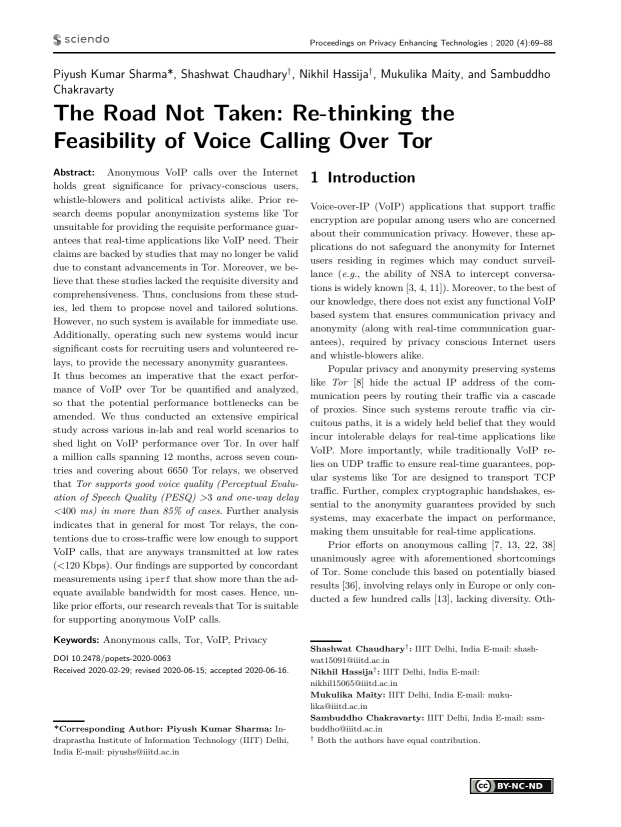The Road Not Taken: Re-thinking the Feasibility of Voice Calling Over Tor
Authors: Piyush Kumar Sharma (Indraprastha Institute of Information Technology (IIIT) Delhi, India), Shashwat Chaudhary† (IIIT Delhi, India), Nikhil Hassija† (IIIT Delhi, India), Mukulika Maity (IIIT Delhi, India), Sambuddho Chakravarty (IIIT Delhi, India)
Volume: 2020
Issue: 4
Pages: 69–88
DOI: https://doi.org/10.2478/popets-2020-0063
Abstract: Anonymous VoIP calls over the Internet holds great significance for privacy-conscious users, whistle-blowers and political activists alike. Prior research deems popular anonymization systems like Tor unsuitable for providing the requisite performance guarantees that real-time applications like VoIP need. Their claims are backed by studies that may no longer be valid due to constant advancements in Tor. Moreover, we believe that these studies lacked the requisite diversity and comprehensiveness. Thus, conclusions from these studies, led them to propose novel and tailored solutions. However, no such system is available for immediate use. Additionally, operating such new systems would incur significant costs for recruiting users and volunteered relays, to provide the necessary anonymity guarantees. It thus becomes an imperative that the exact performance of VoIP over Tor be quantified and analyzed, so that the potential performance bottlenecks can be amended. We thus conducted an extensive empirical study across various in-lab and real world scenarios to shed light on VoIP performance over Tor. In over half a million calls spanning 12 months, across seven countries and covering about 6650 Tor relays, we observed that Tor supports good voice quality (Perceptual Evaluation of Speech Quality (PESQ) >3 and one-way delay <400 ms) in more than 85% of cases. Further analysis indicates that in general for most Tor relays, the contentions due to cross-traffic were low enough to support VoIP calls, that are anyways transmitted at low rates (<120 Kbps). Our findings are supported by concordant measurements using iperf that show more than the adequate available bandwidth for most cases. Hence, unlike prior efforts, our research reveals that Tor is suitable for supporting anonymous VoIP calls.
Keywords: Anonymous calls, Tor, VoIP, Privacy
Copyright in PoPETs articles are held by their authors. This article is published under a Creative Commons Attribution-NonCommercial-NoDerivs 3.0 license.

